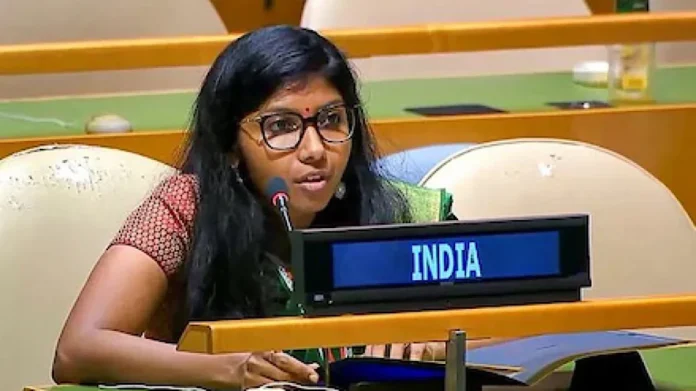New Delhi, Sept 28: India delivered a sharp warning to Pakistan on Friday at the United Nations General Assembly (UNGA) in response to Pakistani Prime Minister Shehbaz Sharif’s speech, which focused on the Jammu and Kashmir issue. India emphasized that Pakistan’s continued support for cross-border terrorism would inevitably lead to severe consequences.
Bhavika Mangalanandan, India’s First Secretary to the UN, issued a strong rebuttal, accusing Pakistan of complicity in global terrorism and accusing it of using terrorism as a state policy for decades. Her statement followed Sharif’s call for India to reverse its 2019 decision to abrogate Article 370, which removed Jammu and Kashmir’s special status, and his demand for dialogue between the two nations.
Mangalanandan called Sharif’s remarks “audacious,” given Pakistan’s global reputation for terrorism, narcotics trade, and transnational crime. She highlighted attacks by Pakistan-based terror groups, such as the 2001 Parliament attack and the 2008 Mumbai attacks, to underscore the country’s involvement in terrorism. “Pakistan’s fingerprints are on many terrorist incidents around the world,” she stated.
India also dismissed any notion of a “Strategic Restraint Regime” with Pakistan unless terrorism is eradicated, declaring, “There can be no compact with terrorism.” Mangalanandan referenced Pakistan’s historical ties to terrorists, including harboring Osama bin Laden, as evidence of its troubling global role.
In addition to terrorism, India raised Pakistan’s internal human rights abuses, including the 1971 genocide in Bangladesh and the persecution of minorities. Mangalanandan criticized Pakistan’s attempts to lecture the world on intolerance, calling it “ridiculous” given its own track record.
Pakistan responded by invoking its Right of Reply, rejecting India’s claims as “baseless and misleading,” while reiterating the demand for a referendum in Jammu and Kashmir in line with UN Security Council resolutions.


